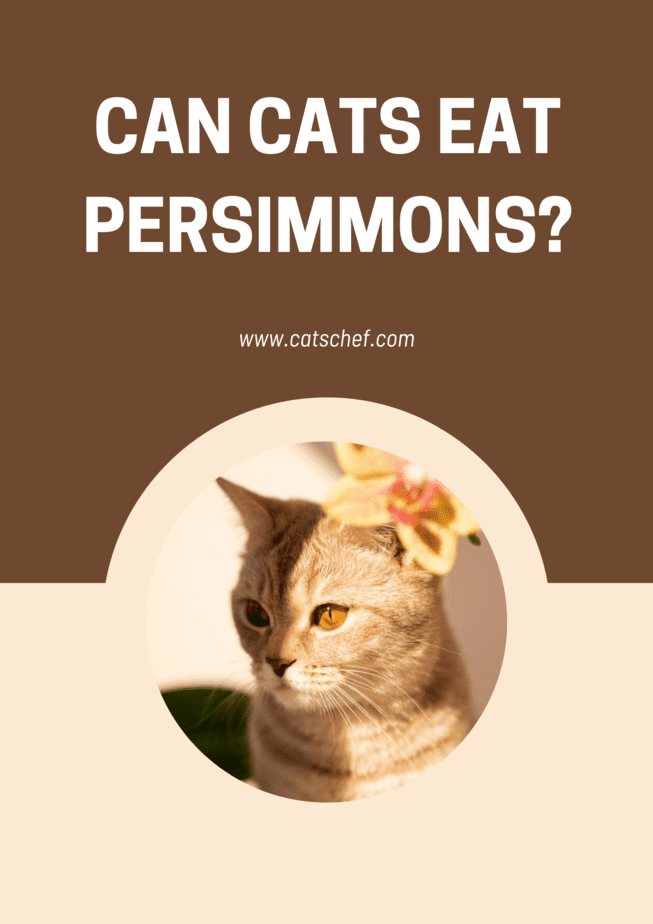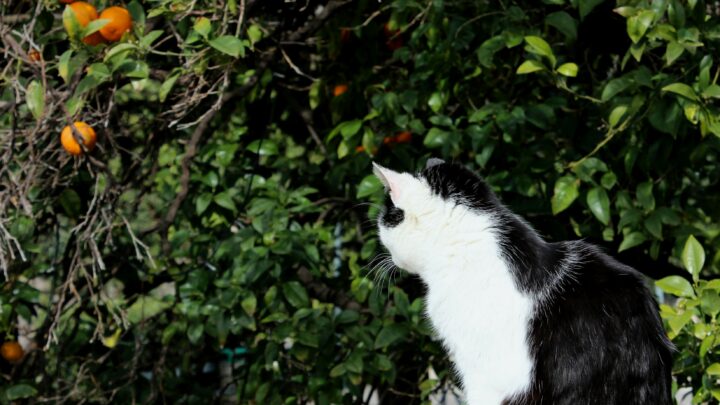You love your cat more than anything in the world, but she can be a real pain in the neck. You’re not even surprised when you come home from work and you find her face-first in a bowl of fruit. She doesn’t even like fruit! Now you have to go online and google ”Can cats eat persimmons?”
You might even find yourself wondering whether you’re the only one who can’t withstand a ravenous rascal’s irresistible meows and sweet purrs. Trust me, each and every cat parent in the world relates to not being able to say no to their furbaby.
Sometimes you just have to choose between your cat’s happiness and her well-being. I mean, you’re the one that has to look out for her nutritional needs and make sure her curiosity doesn’t get her in trouble. Her angry hissing might say otherwise, but deep down she’s thankful for your effort!
So, can cats eat persimmons? You’ll be pleased to find out that your precious purrincess won’t experience any adverse reactions after face-planting into your bowl of fruit.
Not only are persimmons completely safe for cats, but they also contain a bunch of vitamins, minerals, and antioxidants.
So, what are persimmons?
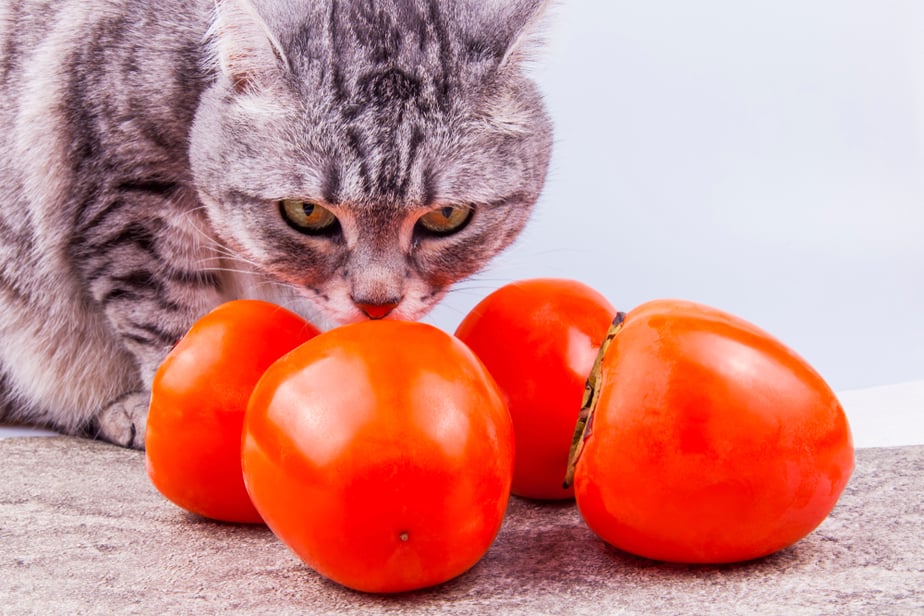
Now that we know they’re not harmful to your feline friend, it doesn’t hurt to learn a bit more about these delicious fruits. Let’s see what we’re dealing with.
Persimmons are edible berries (yes, you read that right!) that grow on a variety of trees in the genus Diospyros. The most cultivated ones are Asian persimmons, but America has its own native Diospyros virginiana persimmons as well.
These incredibly flavourful morsels range in color and size. Depending on the level of ripeness, they can go from light yellow to dark red-orange. They’re quite odd in shape, as well. Persimmons can be round, heart-shaped, or even pumpkin-shaped. No wonder your cat finds them irresistible!
Here’s the thing about persimmons. While most of them are completely safe, delicious, and nutritious, some persimmons are astringent. That means that they contain high levels of soluble tannins, a compound responsible for making certain plants unpalatable.
The sole purpose of tannins is to deter animals from eating a plant’s fruit or seeds before it’s ripe. That mouth-coating feeling you get from biting into an unripe peach or plum is this compound’s fault!
So, tannins sound suspiciously dangerous. Can cats eat persimmons considering the fact they typically contain this compound? Absolutely yes! All you need to do is make sure your persimmons are completely ripe and softened before you feed them to your precious pet.
Do cats even like persimmons?
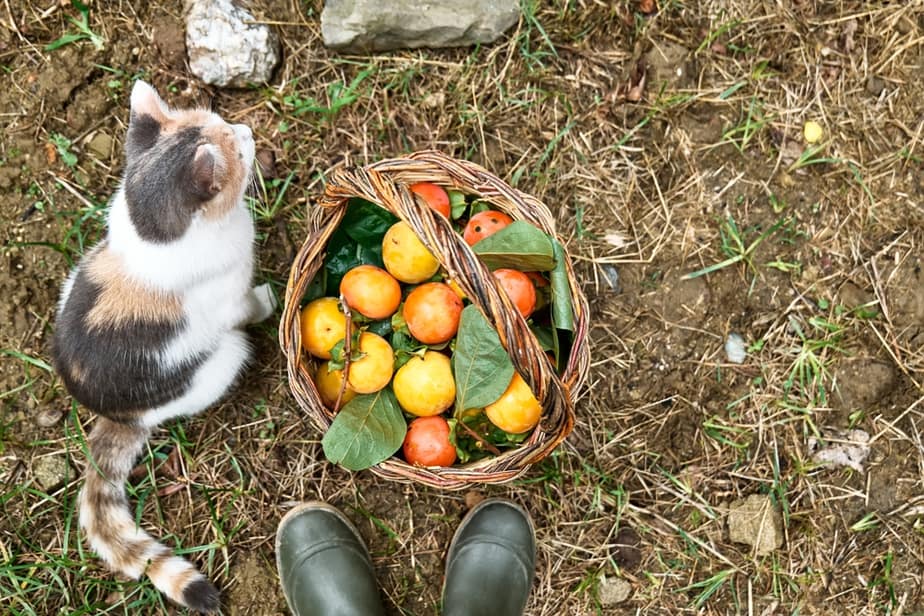
Oh, the age-old question! Cats are obligate carnivores, which means they require lots of animal-sourced protein, vitamins, and minerals in their regular diet. Treats and snacks should only comprise about 10% of their daily food intake.
Trust me, your picky eater would rather munch on some mouth-watering steak bites! But cats are curious creatures, so it’s no wonder yours seems to be showing a sudden interest in fruit. She’s probably seen you gobble down an entire bowl of persimmons, so she’s interested in giving them a go.
Believe it or not, cats can’t taste sweet things. They’re born with a genetic defect because they lack one of the two genes necessary to detect sweet taste. That might be one of the reasons cats don’t require fruits and other sweet things in their diets.
So, do cats even like persimmons? They’re most likely to give them a sniff, a gentle push with their paw, and walk away. But, don’t forget that all cats are different! It’s quite possible that your feline friend will give them a taste, fall in love with their texture, and ask for more.
You might still be on the fence about whether cats can eat persimmons, so here are a couple of reasons you may want to use these delicious morsels as an occasional treat for your mischievous muncher.
Can cats eat persimmons?
They absolutely can! Persimmons are your cat’s personal garden of Eden when it comes to vitamins, minerals, and antioxidants. The only thing you need to keep in mind is to wait until your persimmons are ripe, remove the skin and pit, cut them into smaller bites, and control the portion size.
If you make sure your feline friend eats them correctly, persimmons might provide her with a generous dose of nutritional and health benefits. They certainly deserve a closer look!
1. Persimmons contain lots of vitamins
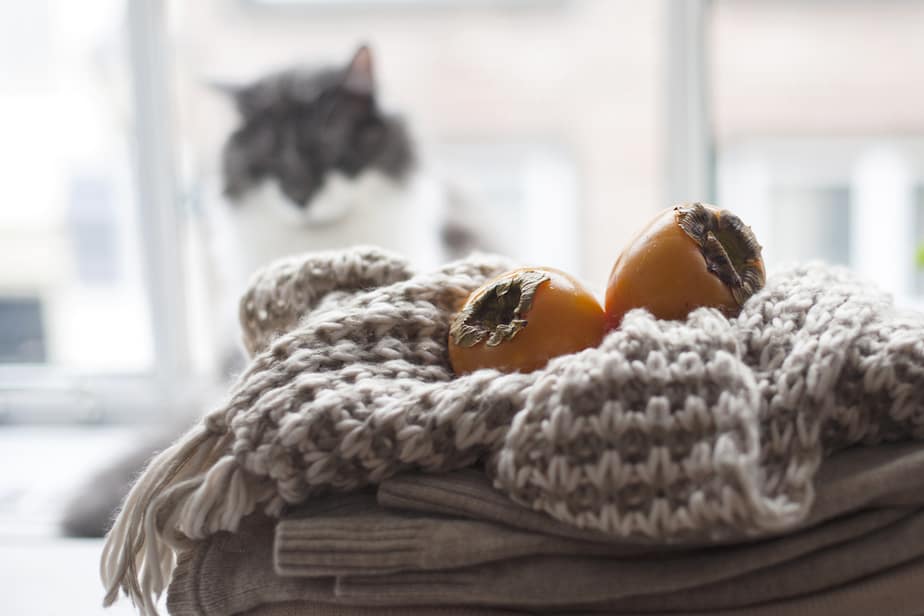
These mouth-watering berries might provide your cat with heaps of vitamin A and C. While cats are obligate carnivores and get most of their vitamins and minerals from animal sources, it doesn’t hurt to add some more in form of a delicious fruity treat.
Vitamin A is an essential vitamin in the feline world, which means your cat needs it to obtain optimal health. This vitamin is a fat-soluble vitamin that typically gets stored in the fatty tissue or the liver. It’s crucial for your cat’s immune system, skin, coat, and muscle health, as well as healthy vision.
It’s important to mention that too much vitamin A can lead to vitamin toxicity. The most common symptoms are abdominal pain, excessive urination, diarrhea, and vomiting. Therefore, give persimmons and any other fruit as an occasional treat rather than a substitute for regular meals.
Here’s some fascinating info if you don’t already know it: Cats can make their own vitamin C. Your cat isn’t likely to experience vitamin C deficiency unless she has some underlying health issues. If she does, you won’t have to resort to supplements as persimmons contain lots of vitamin C.
2. Persimmons are rich in antioxidants
Antioxidants are substances that protect your cat’s body against free radicals. Free radicals are molecules that are produced when your cat’s digestive system breaks down food. They can play a major role in heart disease, various types of cancer, and other dangerous illnesses.
Persimmons are packed with vitamin E (which is believed to be the strongest antioxidant), flavonoids, and carotenoids. Vitamin E is another essential vitamin responsible for your cat’s optimal health. It can provide incredible benefits to your cat’s skin and coat.
While your cat should get most of her antioxidants from animal sources (like salmon, tilapia, cod, and haddock), it doesn’t hurt to munch on fruit every now and then. Flavonoids and carotenoids found in persimmons can also neutralize the effects of chronic inflammation.
So, can cats eat persimmons? Heck yeah! Fruit might get a bad rep in the feline world because of different toxins and poisons, but your cat won’t have that issue with the flesh of this delicious fruit. It’s always good to play it safe, so make sure to remove all the potentially harmful parts like skin and seeds.
3. Persimmons are packed with fiber
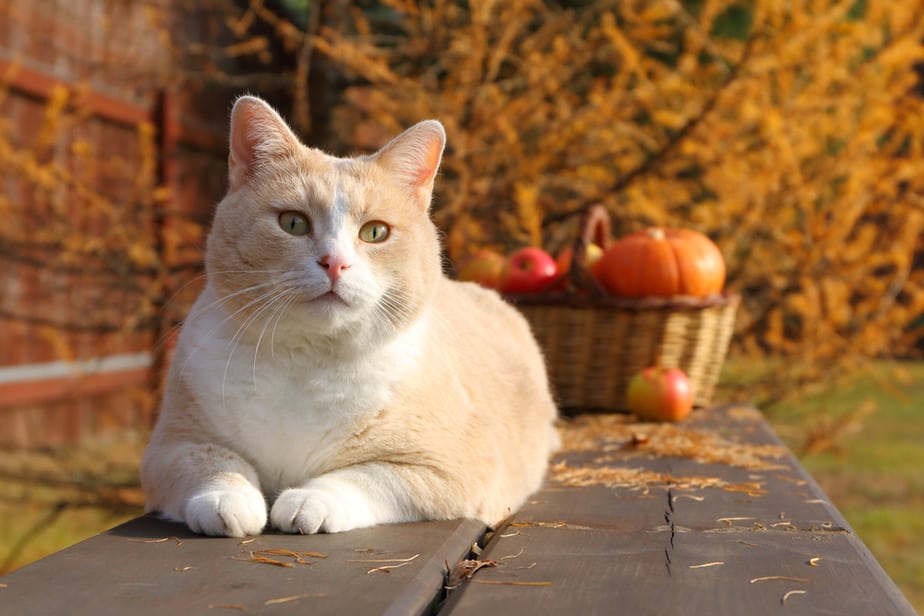
Be honest, has your mischievous monster been packing on some weight lately? She might look adorable with all that extra fluff, but feline obesity isn’t something to joke around with. Not only can it lead to other serious health issues, but it’s incredibly difficult to manage.
Fiber-packed foods are an excellent choice for chonkies. They can help with digestive functions because they provide bulk to help food move through the intestines. They can be beneficial in cases of constipation, diarrhea, and diabetes.
Luckily for you, 100 grams of persimmon contains around 3.6 grams of fiber. These numbers might not seem high enough to you, but your cat has different requirements. While fiber is great for ensuring optimal digestive health, too much fiber might lead to even more digestive issues.
4. Persimmons are packed with water
If you’re still wondering whether cats can eat persimmons, take a look at their water content! Cats are notoriously bad at keeping their hydration levels in check. They walk past their water bowl, give it a little lick from time to time, and that’s about it.
This is why it’s a great idea to include some fruit in their diet every now and then. Persimmons are 80% water, which makes them an excellent choice for cats who prefer eating their liquids. An occasional persimmon treat should ensure optimal hydration levels.
In addition to this, persimmons might work synergistically with fiber to ensure weight loss in obese cats. Higher water content might provide a longer sense of fullness, in turn preventing your feline friend from overeating. Two birds with one stone!
5. Persimmons are low in calories
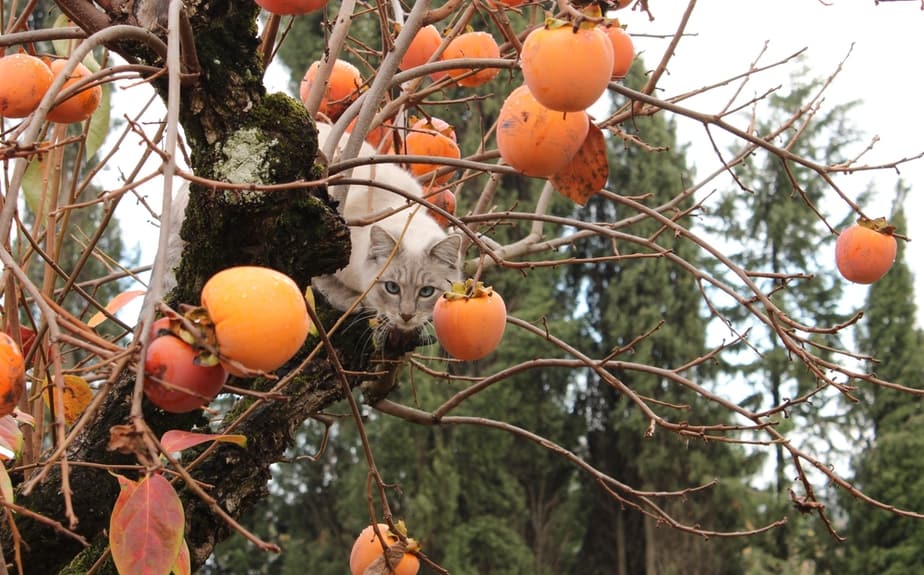
Three birds with one stone!? Not only are persimmons packed with fiber and water, but they’re also incredibly low in calories.
Believe it or not, 100 grams of this fruit contains only around 125 calories. This is wonderful news for cats dealing with weight issues.
It’s important to mention that you should always consult with your vet before making any significant changes to your cat’s diet. You shouldn’t use persimmons as a substitute for your cat’s regular protein-packed meals (even if you’re trying to get her to lose weight).
But, if your chunky cat happens to get her paws on your fruit bowl, you have nothing to worry about! Not only are persimmons low in calories, but they make for an excellent occasional treat for cats dealing with digestive or weight issues.
Are there any reasons cats shouldn’t eat persimmons?
You can’t have the good without the bad! Persimmons aren’t toxic to cats, but there are a couple of things you need to consider before feeding them to your precious pet. Cats can eat persimmons, but only in moderation and after you have removed any harmful bits and pieces.
Don’t forget – you shouldn’t let these unfavorable things discourage you from exploring the wondrous world of persimmons. They should serve you as a nudge in the right direction, and as a guarantee that you’ll be careful when introducing new foods to your cat’s diet.
1. Sugar
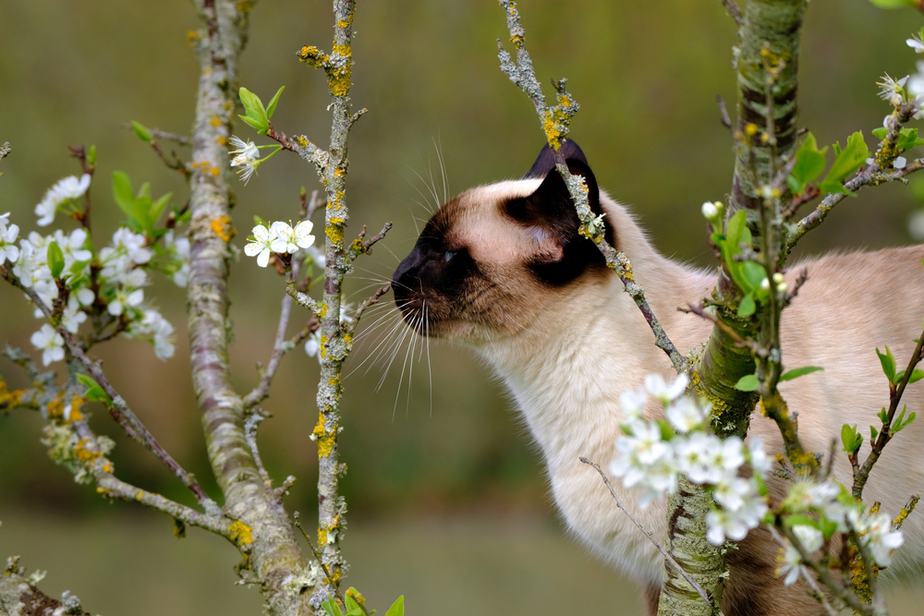
Repeat after me: ”Cats are obligate carnivores!” While this means they require a protein-packed diet, it also means that their digestive system isn’t designed to break down carbohydrates. And what’s sugar? It’s a simple carbohydrate that provides energy to your body.
Since your cat isn’t good at breaking down sugar, eating too many persimmons might lead to serious digestive issues. You might want to keep an eye out for symptoms such as abdominal pain, diarrhea, and vomiting. After all, 100 grams of persimmons contain 13 grams of sugar!
Feline obesity, diabetes, and tooth decay are only some of the dangerous diseases she might experience if she continues to consume excessive amounts of sugar. You can prevent them with regular check-ups at your vet’s office and by controlling the amount of sugar-packed foods your cat consumes.
2. Skin and seeds
The most dangerous parts of the persimmon berry are the skin and seeds as they contain cyanide. In fact, most fruits contain some sort of a toxin within their skin, leaves, stems, seeds, or pits. This is why it’s crucial to prepare them correctly before feeding them to your pet.
Cyanide is a potentially deadly chemical that can exist in various forms. It’s typically released from natural substances in certain foods and plants. Persimmons contain a substantial amount of chemicals that are metabolized to cyanide.
If your cat accidentally eats an entire persimmon, she might experience cyanide poisoning. The most common symptoms are dilated pupils, vomiting, heavy panting, respiratory issues, and bright red-colored gums. If you notice any of these, contact your vet immediately.
In addition to that, persimmon seeds and pits can be a choking hazard. You should always remove the skin and the seeds before cutting your persimmon into smaller bites. If in doubt, use regular cat kibble as a size comparison.
3. Allergies
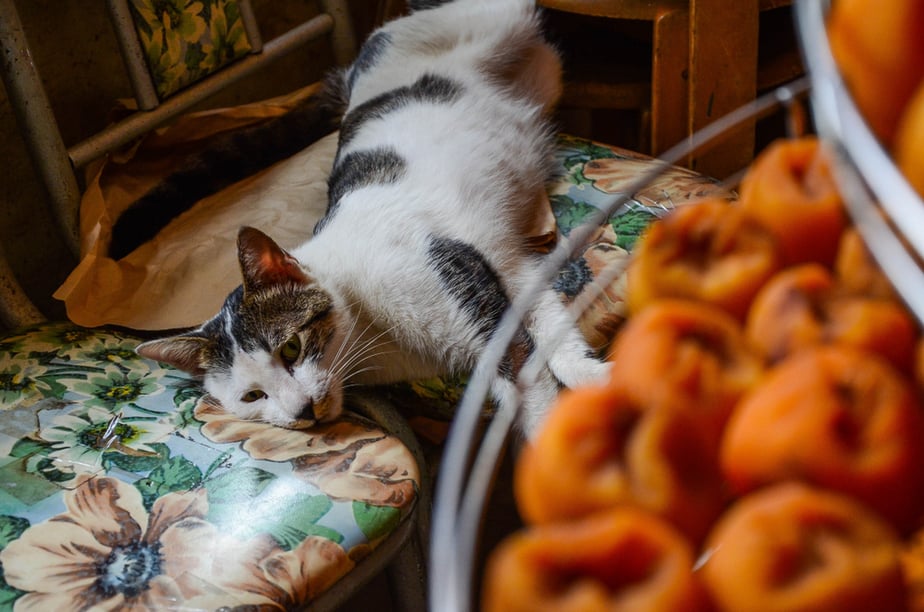
Believe it or not, cats can develop allergic reactions to persimmons. While fruit allergies aren’t common in the feline world, it doesn’t hurt to be extra careful. Keep an eye out for symptoms such as vomiting and diarrhea, as well as signs of respiratory distress, skin itchiness, and even anxiety.
If you notice your cat experiencing any of these symptoms, it’s time to contact your vet immediately, who will provide you with proper medication and advice on how to proceed with the situation. If your cat’s symptoms seem severe, it’s best to go to emergency animal care.
Can cats eat other fruit?
Absolutely! Persimmons are an excellent choice for an occasional treat for cats because they contain a bunch of vitamins, minerals, and antioxidants. But if your feline friend isn’t a big fan of this odd-looking berry, you can always turn to other fruit.
Peaches share a similar texture with persimmons, so your feline friend might show some interest in them. They’re a great source of vitamin C, vitamin A, magnesium, and potassium. They’re also water-dense, so they can be a useful aid in keeping your cat’s hydration levels in check.
Kiwi might look like a hairy potato, but it can be an excellent treat for your equally furry feline friend. This fruit contains plenty of vitamins, minerals, and antioxidants that can help boost your cat’s immune system, and keep her coat shiny and healthy.
We answered so many questions today! Can cats eat persimmons? Can cats eat other fruit? The answer to both questions is yes, as long as you make sure to consult with your vet before making any significant changes to your cat’s diet. Good luck!
